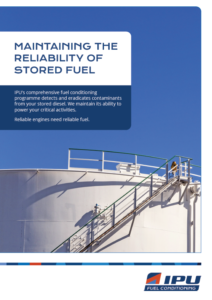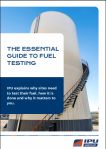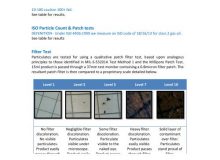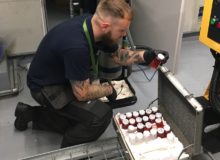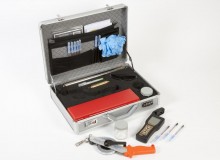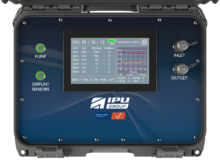Diesel Testing – DieselCheck Service & Kits
Diesel testing is the essential and economical first step to reliable power systems. Any building, site or facility that uses generators to provide critical power needs to test its fuel regularly. A generator is only as good as the fuel that feeds it. IPU offers DieselCheck, a comprehensive Diesel Testing Service and range of self-service kits. They give you accurate and reliable analysis of what’s in your tank.
Our Essential Guide to Fuel Testing handbook offers an explanation as to why diesel testing is so important, how it is done and the cost-effective solutions that IPU provides. Click here to request your free copy
IPU Diesel Testing Service Methods
Using state of the art equipment and globally recognised methods and standards, IPU’s DieselCheck Diesel Testing Service will provide you with accurate, reliable fuel quality reports. We can even interpret the results for you and recommend a course of corrective actions if needed.
Our testing can be delivered to you in one of three ways:
- on-site service
- deliver a sample to us for us to analyse
- self-service
| IPU’s on-site service | Self-service: DieselCheck Portable Fuel Analyser |
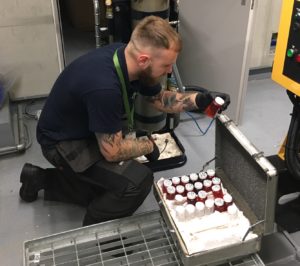 |
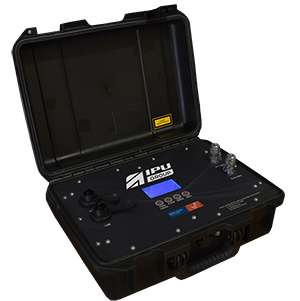 |
| The IPU team will come on-site to take samples | Allows you to conduct accurate, on-site testing of your own |
| We will analyse on-site using a DieselCheck unit, then take samples away and provide a more comprehensive report | Identifies all 3 major types of contamination |
| View service | View product |
| Self-service: Fuel Sampling Kit | Self-service: Fuel Test Kit |
 |
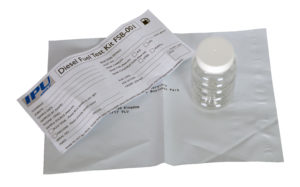 |
| Allows you to take your own samples and do some high-level analysis | Simply a sample jar, information sheet and secure envelope |
| Everything you need, including jars, dip tape and safety equipment | Take your own samples and send back to us for comprehensive analysis and a full report |
| View product |
Frequently asked questions:
- What does IPU's DieselCheck service examine?
- Particle Count to ISO4406 or NAS – A measure of the general cleanliness of fuel by counting the amount and size of particle contamination.
- Karl Fischer Water Content to IP438 – A measurement of the amount of water in your fuel (includes dissolved, emulsified and free water).
- Adenosine Triphosphate (ATP) Test: An ATP test accurately determines the level of microbial activity in fuel.
- Metals Content – Uses the spectrographic method to detect levels of wear metals within your fuel.
- Bio-Diesel Content – Detects the exact amount of biodiesel (FAME) in fuel.
- How is fuel sampled?
During a DieselCheck diesel fuel test, our engineers take a sample from the top, middle and bottom of each tank. This is a crucial step. Depending on where you take your samples, you may get a different result. If you only test the bottom or top you could get an inaccurate reading.
For example, if you take a sample just from the bottom of the tank you may see a high concentration of water. This is because water coalesces and sinks to the bottom. However, if you only take a sample from the top of the tank you may see fuel that looks a lot cleaner than the majority of the stored diesel.
IPU provides you with a complete view of your fuel to make sure there are no nasty surprises. Our short video explains how we do this.
- What reporting will I get from IPU's DieselCheck diesel testing?
Following a DieselCheck fuel test, we will provide you with a complete analysis on what’s in your storage tank. This report is simple to understand and gives you a 360-degree view of your fuel.
- DieselCheck reports clearly illustrate areas of concern.
- DieselCheck compares scans of your fuel against industry standards.
- DieselCheck uses real photos to illustrate problems.
The report includes images of the samples and an explanation of what that means. If contamination is found we will recommend a clear course of action to restore your fuel to EN 590 standards.
- What are your Self-Service DieselCheck Diesel Testing Kits?
Not only can IPU support you with regular testing, we can also train your maintenance staff to conduct your own tests according to your own schedule. This facility is appreciated in two circumstances:
- In critical or highly contaminated environments where fuel has to be tested on a weekly or fortnightly basis. Such frequent visits would be prohibitively expensive. Self-service is a more cost-effective option.
- In high-security buildings where site access is difficult. A lot of IPU’s work is on government or military sites. Although we are familiar with security clearance procedures, some customers prefer to skip the disruption and do the testing themselves.
For self-testing we recommend the IPU Fuel Test Kit which contains all the tools you need to regularly test your stored diesel. For more information please use the link at the bottom of the page.
- Why test your diesel fuel?
Today’s common rail diesel engines operate at injection pressures up to 35000psi. They are extremely intolerant of the slightest diesel contamination.
Abrasive particles and water will quickly cause damage and result in equipment downtime. Furthermore, the fine filtration systems designed to protect the engine can easily become clogged if microbial biomass enters the fuel system from the storage tank.
Some forms of contamination can spark a vicious circle, encouraging the growth of other types of contamination. For example, free water promotes microbial growth (aka the diesel bug). Water also accelerates diesel oxidation which leads to the formation of acids and gums in your fuel.
Today’s biodiesel is less stable than petrochemical diesel and is more prone to oxidation. It is also more hygroscopic and will absorb more moisture from the atmosphere. As ambient temperatures change this moisture condenses out of the fuel to form free water at the bottom of the fuel storage tank. This is the breeding ground for the diesel bug.
Major fuel companies and engine manufacturers are now recommending that a fuel conditioning programme is introduced wherever diesel is being stored for long periods of time. A key component of such a fuel conditioning programme is regular fuel testing. By testing your fuel for water content, for bacteria in fuel and general cleanliness you can prevent the possibility of premature engine fuel filter blockage, unscheduled maintenance and equipment damage and downtime. Where fuel is being stored for a safety critical application such as a fire pump or standby generator you will have the certainty that your fuel will be in prime condition when you need it most.
- How else can IPU help?
DieselCheck is the first stage in IPU’s Fuel Conditioning Programme. The three-part programme is the simplest and most economical route to clean, dry, reliable fuel. It includes:
-
-
- DieselCheck Fuel Testing
- ClearTank Fuel Cleaning
- Diesel Defence Fuel Polishing
-
-
- Videos
Our short video explains why fuel becomes contaminated and what can happen if the issue is ignored:
Here is our DieselCheck portable analyser in action:
Our short video explains the four stages of the programme and how that can keep your diesel clean and dry:

